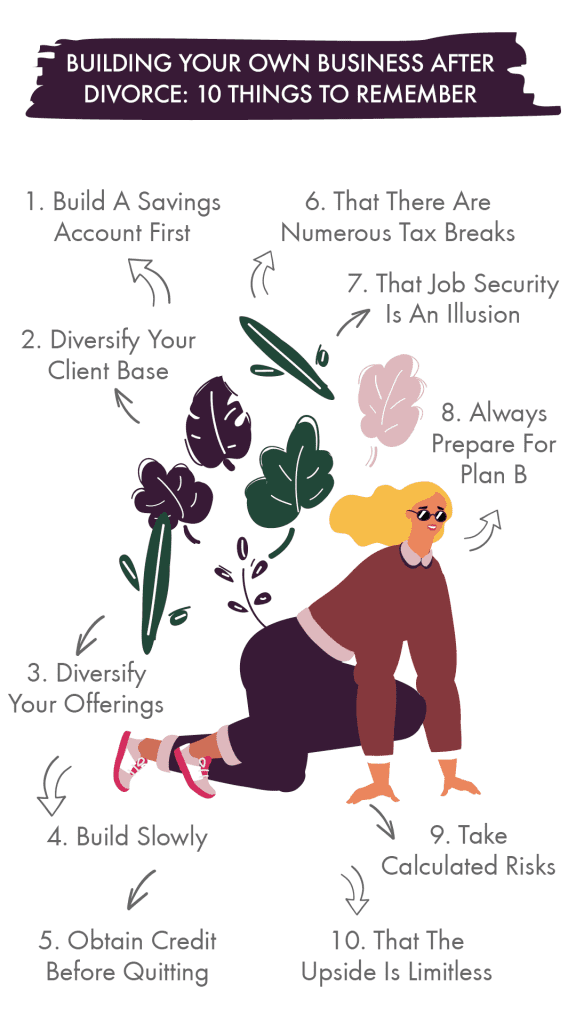
Divorce is expensive. Not only when it comes to legal fees, either. Splitting assets, incurring or becoming dependent on alimony and child support payments, and having a less disposable income can each have a substantial impact on a divorcing couple’s financial picture. People often react by adjusting their budgets and changing their spending patterns, both applaudable efforts. Unfortunately, cutting back on luxuries may not be enough to stave off financial disaster in the long term, and the need to generate money inevitably becomes a more pressing goal.
Anything a man can do, a woman can do while wearing heels. Or pajamas and slippers. Remember that. Whether you’re currently a working mother who wants more than a dead-end nine to five job or a stay-at-home mom who’s trying to get back in the game, anyone, especially a single woman, can build their own company from home. If you are presently having difficulty finding employment, or need to build flexibility into your work schedule, you may want to consider starting your own business. After my divorce and receiving full physical custody of my three school-age children, I did exactly that. And it has been one of the most rewarding experiences of my life. Not to mention, an increasingly lucrative one. Here are some tips that helped me start a business after divorce:

The first question I asked myself is, “What do I have to offer?” In a broad sense, the answer boils down to whether I planned on providing a product or a service. Answering this question meant taking a good, hard look at my skill set and what value I could bring to future customers or clients. As for what kind of business to start, it could be anything. So take your expertise and exploit it. Do you love math? Students young and old always need tutors. Have a passion for graphic design? Re-up on the latest technology at the local community college and start a firm. Personally, I loved to write and founded a client-based agency that allowed me to get back into it. Today, I use the income from it to pay my bills and splurge on myself, at least once in a while.
My educational background is not in business. I studied English during college and then went on to law school immediately afterward. So, for me, there was no “formal” business plan. But there was a plan, with goals and a timeline. I set a timeframe for myself to earn X dollars by a specific date, as well as laid out other career goals that foretold the possibility of monetary success further down the road. With my finances in mind, I frequently re-evaluate the viability of my business model and continue to tweak and redirect as I see fit, understanding that the experience I accumulate now will serve me in the future. In other words, could I afford to take that leap of faith and if I was not able, how could I make it happen? Would I need a business loan? Could I find financing through other means, like selling my diamond engagement ring? The more you can plan for in advance, the easier it will be to reach significant milestones along the way, each of which is an accomplishment unto itself.
For many, starting is often the hardest part. The possibility of rejection is high. So, too, is the chance for wasting time, money, and resources, all can bruise the ego. The problem is if you never set your plan into motion, you never stand to move forward. Regardless of what your product or service is, start out small. As a writer, I needed a place to display my skills and get my name out to the public, so I started a blog or, as I often referred to it, my online résumé. Every skill I hone, every mistake I make, and every milestone I reach adds value to my ever-expanding résumé. As a mother, I managed all of our family’s daily needs, created and maintained a household budget, supervised numerous construction projects, volunteered, and fielded and resolved pretty much every problem that came up. Without even realizing, I cultivated my managerial, organizational, and social skills for years before ever earning a dime.
Anyone, especially a single woman, can start their own company right from home and for little money. I know because I did. When one of my kids got sick and had to be picked up from school, I didn’t have to waste money on a sitter or call a relative; I could get into the car and pick them up myself. In a practical sense, nothing for them changed. The mother they’d grown dependant on could still be there like always, making the divorce less scary in their eyes.
There are other benefits that come from working from home. It provides flexibility and allows for more control, which, in turn, can make you happier, as it did for me. Since my daily commute consists of walking down my stairs every morning, saving me hours of time weekly, I can still do small chores throughout the day, alleviating many of the family pressures placed on me. What I can’t do can wait until after the workday is over.
Another plus? There are numerous tax breaks available to small business owners. Your finances are about to change just as much as your life will. By working at home, you can save yourself some much-needed dollars. Consider these: office expenses, a portion of your home’s square footage, and your phone bill (or part of it) may all be tax-deductible. As long as you’re in charge, you can save yourself money where it really matters.
If you’ve toyed with the idea of freelancing or contracting instead of showing up for a 9 to 5, Dena Landon has some tips that helped her make it work
While conventional wisdom says that you should have three to six months of expenses in savings, I advise building up more than that. If you lose a main client, it can take time to find one or more clients to replace them. Plus, what if something else goes wrong while your income takes a dip? Life is unpredictable; no one knows that better than a divorced woman. If at all possible, make sure you have a cushion before handing in your resignation letter. And when you do need to draw down on the savings, try to repay it as soon as possible. I repaid the money I’d taken out for rent the next month.
If you’re going to make it as a freelancer you need discipline and time management skills, and a lot of drive. Single moms have all that in spades.
July taught me a valuable lesson. Having one client who makes up over 50% of my income just wasn’t a good idea. I hustled like mad that month, bringing on three new clients and sending out over ten applications a week. My new goal is to never rely on one client for more than 20% of the monthly income I need to survive. The client who halted production in August came back in September with more work. I was lucky in that I’d found a client for whom I could do as little or as much work as I wanted, so I wasn’t too swamped. In addition to diversifying your client base, try to build in that flexibility.
At first, I wrote only in the parenting and divorce space. I quickly realized that it limited my client base. Plus, I worried that I’d burn out writing and coming up with new ideas in one area. So I decided to diversify. I enrolled in a search engine optimization course at Coursera. Once done, I added analyzing websites for SEO, providing content marketing plans for small businesses, and scheduling and sharing content to my product offerings. And shortly thereafter landed a client in that space.
I also recommend building slowly. While I built my freelance business, and am still building it, I worked full-time. In a way, we divorced women have it lucky in this respect. Because I had weekends and some nights “off,” I could come home from the day job and log-on. If you’re going to make it as a freelancer you need discipline and time management skills, and a lot of drive. Single moms have all that in spades. Give yourself a few months, or longer, to learn how you work without supervision. To discover how long it really takes you to accomplish a task or complete a project.
Banks don’t like extending credit to people whose job doesn’t deposit a bi-weekly paycheck into their account. Access to credit helps out on rainy days. Even with a savings account you might find yourself in a situation where you can’t or don’t want to pay cash. Life has no guarantees. Marriage has no guarantees. If you’ve been thinking about making a change, you can do it successfully with some planning and hard work. Freelancing isn’t for everyone, but if you can make it work and you’re the type of person who needs flexibility in their lifestyle, it’s guaranteed to make you happy. My only regret is that I didn’t do it sooner.
If worse comes to worst and your business doesn’t get off the ground, don’t fault yourself for trying. There’s always the uncertainty you’ll fail, that you won’t have enough money to support your family, or maintain your lifestyle. If this should happen, what you can do, especially moms like me who didn’t work once they had kids and now, as a result, must flaunt the skills they have recently acquired, is put the experience you gained from your latest venture on your resume and show how resourceful you can be. Discuss your business aptitude at your future interviews. Use it to get hired somewhere else. There’s always a Plan B.
©2011-2024 Worthy, Inc. All rights reserved.
Worthy, Inc. operates from 25 West 45th St., 2nd Floor, New York, NY 10036